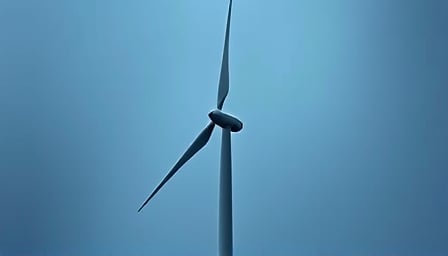Orsted AS: Navigating Turbulence Amid U.S. Government Intervention
In a dramatic turn of events, Danish renewable energy giant Orsted AS finds itself at the epicenter of a geopolitical storm. The company, renowned for its pioneering work in offshore wind farms, bioenergy, and waste-to-energy solutions, is now grappling with a significant setback in the United States. The Trump administration’s recent directive to halt the nearly completed Revolution Wind project off the coast of Rhode Island has sent shockwaves through the industry and raised questions about the future of renewable energy investments in the U.S.
A Strategic Pivot Amidst Crisis
Orsted’s response to this unforeseen challenge has been swift and strategic. The company has announced plans to proceed with a substantial €6 billion (approximately 60 billion DKK) preferential share issuance. This move, aimed at bolstering its financial resilience, underscores Orsted’s determination to navigate through the crisis. By selecting a consortium of banks to lead this issuance, Orsted is not only securing the necessary capital to sustain its operations but also signaling its confidence in the long-term viability of its business model.
The Ripple Effects of a Stop-Work Order
The U.S. government’s intervention has not only jeopardized the Revolution Wind project but also cast a shadow over Orsted’s broader ambitions in the American market. Analysts speculate that this could potentially lead to Orsted reconsidering its U.S. operations, a scenario that Citigroup has hinted might result in an exit from the U.S. market. Such a development would not only be a blow to Orsted but also to the U.S. renewable energy sector, which has been increasingly reliant on foreign investment and expertise.
Financial Markets React
The financial markets have reacted to these developments with a mix of concern and cautious optimism. Orsted’s share price, which has seen fluctuations in the wake of the stop-work order, could face further pressure. However, the company’s proactive measures, including the share sale, have been met with a positive response from credit rating agencies. Fitch Ratings, for instance, has upgraded Orsted’s outlook to stable from negative, reaffirming its long-term credit rating at BBB. This endorsement reflects confidence in Orsted’s strategic direction and its ability to weather the current storm.
Looking Ahead
As Orsted navigates these turbulent waters, the company’s resilience and adaptability will be put to the test. The halt of the Revolution Wind project is a significant setback, but Orsted’s strategic response highlights its commitment to its core mission of advancing renewable energy. The coming months will be crucial in determining the long-term impact of the U.S. government’s actions on Orsted’s operations and the broader renewable energy landscape.
In conclusion, Orsted’s current predicament is a stark reminder of the complex interplay between geopolitics and the renewable energy sector. As the company seeks to mitigate the impact of the U.S. government’s intervention, its actions will be closely watched by investors, policymakers, and industry stakeholders alike. The outcome of this saga will not only shape Orsted’s future but also influence the trajectory of renewable energy development in the United States and beyond.
